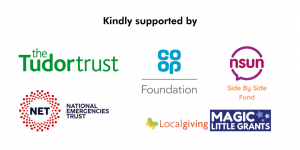In this blog, Emma writes about her experience of grief at a young age, after her mum passed away when she was 18. Together, we’re talking through the taboos of loss and death. Get in touch to share your story.
Back in 2013, I had the news that my Mum had passed away. Something I never thought that I would have to go through at the age of 18.
If you knew me, you would know that I’m not exactly shy, but behind the scenes it can sometimes be a different story. This was a hard article to write, but this is my experience of suffering a loss very close to me and by writing this, I hope it can help even just one person going through something similar, to feel a little bit better about it.
Immediate chaos
The first few weeks after losing someone close to you is very chaotic. People come to check on you all constantly, your Facebook Messenger will be constantly flashing up and you’ll be bored of hearing your text messages ping, but you will need this. You may not realise it straight away, but all of the support is very much needed. You probably won’t even need to cook for weeks because of all the food people will bring you (which was a good thing for me as I really can’t cook!).
Going through the milestones gets harder and harder. I started university last year and, like most people, the first person I wanted to tell was my Mum. If I’ve had a hard or stressful day at uni (which as any student will know, happens a lot!), I still go to pick up the phone. It’s just one of the triggers that occur during the days, weeks, months and years that pass. This can be anything from, seeing an old TV show, recalling a funny moment or weirdly for me, when the compare the meerkat advert comes on TV! Everyone is individual and it’s ok to show emotion when they come.

One of the hardest things for me was people avoiding conversation with me in the weeks after and I completely get it. People don’t know what to say to you. But that is hard to accept.
You’re not the only one
It’s easy to absorb the feeling that you’re the only one who has gone through the stages of grief and feel isolated. You may not always know anyone close to you that has been in the same position.
For me, I still find it easier talking to people that have been in the same situation as me and even reading online about people’s experience.
Prince William was only 15 years old when Princess Diana died, and in a recent interview during the making of a BBC documentary Mind Over Marathon, he described grief as, “The shock is the biggest thing, and I still feel it 20 years later about my mother. People think shock can’t last that long, but it does. It’s such an unbelievably big moment in your life and it never leaves you, you just learn to deal with it.”
Everyone goes through this
Some people just don’t know what to say during times like these. They don’t want to accidentally say something insensitive and insult or upset you. You have to remember that they feel helpless and find the ‘first conversation’ awkward too.
If they ask if you’re ok, don’t be annoyed! Of course you’re not ‘ok,’ but they just want to know how you are, even if the answer is obvious.
For me, the hardest part of losing someone so close is the process after the chaos. When the people stop visiting, when the cards stop coming, people stop asking about you and life has to carry on as normal. The house becomes quiet and that’s when you start to think about what has actually happened.
Trust them and talk to them
The best advice I could ever give is to find a friend, a family member or anyone you trust and just talk to them. If you’re upset, tell them. If you’re annoyed, vent your anger to them. If you’re worried, let them help you. I have made friends at university in the last year that have helped me more than they’ll ever know. It can take just one or two people to help you through the hard days.
Always talk about the memories because they’ll always be with you. The funnier the memories, the better! My favourite memories include all the shows my sister and I used to put on for my Mum and Dad as kids and all the family holidays! Nothing and no one can take that from you, so don’t be afraid to talk about them and laugh about all the good times.
Finally, it’s ok to feel guilty; it’s natural. I have had many days over the last four years that I have been having a laugh with my family and friends and later feel guilty for it. You have to remember that you can’t change the past, you can only look to the future. So, have a laugh and make new memories is the best advice I could give!
None of us are equipped to handle things like this on our own, at the risk of sounding like Bill Withers, you need somebody to lean on.
Emma Tattum
Enjoyed Emma’s blog? Leave a comment below to let us know your thoughts. Have a story of your own to share? Email us to get in touch and share your advice.


